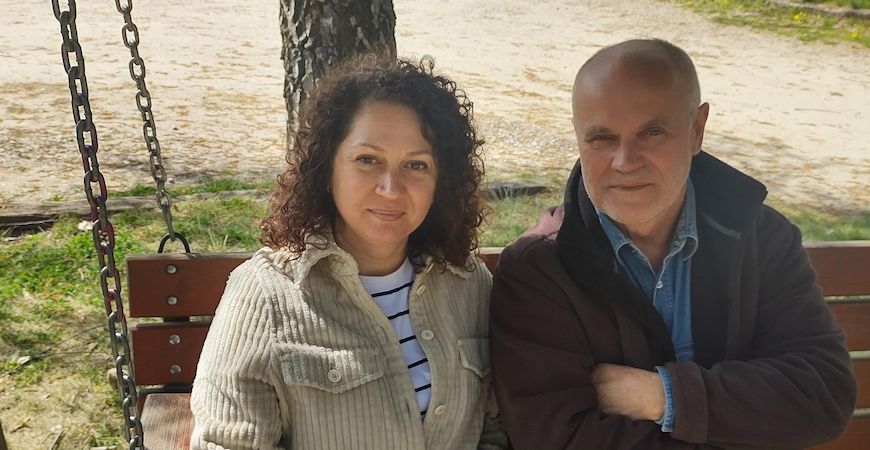Emmaus Oselya’s daily life has been turned upside down
The group has been supporting people fleeing the fighting right from the start of the conflict. Emmaus Oselya has provided support, handed out food, offered accommodation, counselling, and so on. Natalia, leader of Emmaus Oselya in Ukraine, tells us about the community’s daily life, which has been turned upside down since the beginning of the conflict.
How is your community involved in supporting displaced people?
In April, around 50 people came every day to our social support centre in Lviv to take a shower, get their hair cut, do their washing and change their clothes, get something to eat, receive medical care, or simply relax and chat. This makes for a total of over 600 meals handed out, around 100 loads of washing, over 500 items of clothing donated, and close to 200 showers. All of these services are delivered by the community’s companions, who know all about the difficulties of life on the streets. This creates a rapport with the beneficiaries, who are forced to seek help because of the war.
However, our social centre is small – two small rooms and a bathroom. Since the start of the war, the number of people coming to the centre has continued to rise, and it is becoming increasingly difficult to welcome them properly and provide them with support.
Our Emmaus charity shop, located in Vynnyky in the Lviv suburbs, is close to our community house, and reopened in April. However, the air raid warnings and risk of being bombed force us to take refuge in bomb shelters and close the shop regularly. This is having a major impact on our income-generating activity, which is so important for our community and our customers. Once again, thanks to the funding provided by the Emmaus groups, via the Emmaus Europe Ukraine Fund, we are able to maintain our community life and help the displaced people and war victims.
The Lviv charity shop only opens three times a week. On the other hand, the furniture restoration workshop is practically back to normal, and people are placing orders once again. We are delighted about this.
In April, we received a container of humanitarian aid from the Emmaus groups via Emmaus Lublin (the third since the start of the conflict). We are working with a range of associations and volunteers across Ukraine to provide support where it is needed most. In April, we helped the children’s hospital in Chernihiv and Buda Hospital in the Kharkiv region. Much-needed humanitarian aid was delivered to Ovruch, Kharkiv and Chernihiv.
Your community supported the homeless before the war. How are you organising your solidarity work at this time?
Our day-to-day solidarity work continues despite it all, and we are helping everyone who needs it. We distributed around 800 lunches on the streets in April, in addition to the work done at the social centre.
We are also helping the residents of Lviv who are hosting displaced people by providing bedding, mattresses, pushchairs, etc.
We were unable to organise our traditional Easter events for homeless and vulnerable people in the Lviv Region because of the constant threat of air strikes. However, we did hand out 250 food kits in the city centre. We are also meeting the needs of war victims and displaced people: clothing, shoes, toys, and books for 50 children from Mariupol who are now living in Vynnyky.
What do you currently need?
The social support centre premises and equipment are old. We haven’t currently got enough washing machines for all the displaced people to wash their clothes. We are therefore eagerly awaiting the start of the new building reconstruction work so that we can set in motion this initiative.
We also have a major fuel issue in Ukraine, we have to join long queues to buy 5-10 litres of fuel, the maximum authorised amount. We also still need a lot of humanitarian aid to help the regions that have been liberated, and those where violent fighting is continuing, and where people need daily assistance.
How are the companions dealing with the situation?
We currently have 30 companions living in the community. As ever, we are continuing with our everyday work (collecting donated goods from donation drop-off containers, sorting the goods, etc.) This year’s celebrations for Orthodox Easter were not festive. We got together for a breakfast, and we arranged a ceremony to commemorate our community’s founder, Olesya Sanotska, who died six years ago in April 2016. She lives on in our hearts.
An additional companion has joined our three companions who had already enlisted in the armed forces. They are dear to our hearts, and we respect their desire to defend Ukraine.
Our companions are working hard. Air raid warnings are very frequent and often the companions do not want to make their way to shelters, because the raid is far from the community. It is tough for everyone, both physically and mentally.
Nevertheless, the Oselya community’s work is important and enjoys a high profile in Ukraine. A US journalist showed great interest in our work and visited the community to make a report about our daily lives.
How do you see the future?
The situation in Ukraine is very tense, and the war is intensifying. The war, with numerous crimes perpetrated by the Russian army, is calling into question the future of democratic values.
We do all our work with great faith that Ukraine will emerge victorious, and the hope that our country will soon experience peace, and that we will be able to resume a normal way of life.
We express our profound gratitude to all the Emmaus groups for their help and support for our work, and for our struggle for the European values of solidarity, justice and friendship.

© Emmaus Lublin



